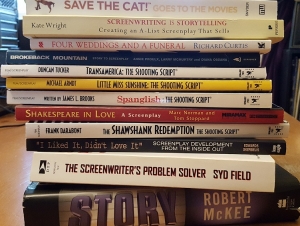
Script Consulting
Do you need a script consultant?
Are you trying to take your screenplay to the next level? Do you have an early draft that needs an objective eye? Or are you simply stuck because you know your script isn’t quite ready?
Writing can, at times, feel like a very lonely endeavor. After living in the world of your story for so long, it can be hard to look at it objectively. That’s why you need a screenwriting consultant who can advise you on how to make your existing script a page turner—a story that grabs the reader and doesn’t let go, a story that a producer will want to invest in, and ultimately see on screen.
Why would YOU hire a script consultant?
You may be a successful writer with credits, or you may be an experienced writer still working in the trenches. Or you may be a writer who is just starting out. Whichever category you fall into, it’s possible that you can be so close to the story you’ve been writing, you need an objective eye to catch things you may have missed—even small details that can cause disastrous plot holes. That’s why a script consultant is a good idea.
A script consultant isn’t for everyone.
You may be used to working a certain way and prefer to take your chances with your own editing. You may also have budget constraints or others you rely on for feedback. If that’s how you need to work, great. There is no one right way to achieve your goals.
Are you ready to get started?
First, the bad news.
It’s all subjective. For a producer to be so invested in your project they want to spend their time and money depends on how much they relate to the subject matter. You have no control over this. If you pitch a sci-fi thriller and the producer has their heart set on a feel-good story about horses, you can’t do anything about that.
How to increase your odds of success as a screenwriter.
Ensure that your script has a universal, relatable theme. Give us a character or character(s) we can care about. If we’re spending two or more hours with them, we need to WANT to know what happens to them. Use techniques that will elicit emotion. Finally, you must also make sure that your script is as polished and gripping as can be (a.k.a. “bulletproof”).
What they don’t tell you. . .
The person you want to read your script probably won’t read it. However, their assistant, or someone at a lower staff level, is more likely to read your script. (Don’t forget–that staff member could be an executive tomorrow.)
How to put tough odds in your favor:
Remember, assistants wade through hundreds of bad scripts. You can make their day with a script they can’t put down. After all, they WANT to be entertained.
Don’t believe everything you hear.
I’ve heard it said that no one in Hollywood reads. That was so disheartening to me, as a writer. But it’s not completely true. Books and short stories are adapted to films all the time.
Kindness goes a long way.
Remember, this is still a business. More people will want to work with you if you’re polite, professional and easy to work with. Leave arrogance and egos at the door. There are plenty of ways to disagree or get your point across without being disrespectful to others.
These 2 THINGS will make or break your script:
Perfect these, make them work to your advantage, and you’re almost there.
- Your opening pages
Chances are, your screenplay is unlikely to be read beyond five to ten pages. So you’ll need to make those pages COUNT.
- Written pitch
Often only the logline and one-pager will be read to determine if they want to request your whole script. Getting those right is CRITICAL.
That’s where I come in.
Who am I?
I’m a Nicholl Quarterfinalist screenwriter, lecturer and published author of four novels. I have developed projects for film and TV with an award-winning producer whose credits include Lord of the Rings, Mission: Impossible, Green Lantern, The Witcher, children’s animated TV and more.
I was:
- Repped by an agent.
- A reader for BlueCat International Screenwriting Competition.
- A Semi-finalist in Slamdance TV scriptwriting competition.
- A Quarterfinalist in Screencraft Comedy Writing Competition.
- A screenwriting instructor—in person and online.
- An international guest lecturer on screenwriting.
- An award-winning marketing copywriter.
My marketing background, combined with my extensive screenwriting experience, makes me the ideal ally for writers.
A little more about me:
- I am a member of, and have led discussions for, Women and Hollywood, which has included guest speakers such as director Paul Feig and actress Robin Wright.
- I’m a freelance editor, of both manuscripts and screenplays.
- I have a B.A. in Motion Picture History, Theory and Criticism from what is now the Tom Hanks Center for Motion Pictures at Wright State University in Ohio. I have studied at the Master’s level at UCLA Extension, completing a four-part course in Writing the Feature Film.
- I’ve been part of virtual writers’ rooms, and I’ve participated in online mentorships to help screenwriters all over the world.
What is the difference between a script consultant and a script doctor?
A script consultant will make suggestions to elevate your project. A script doctor will do rewrites.
What I do:
I’m dedicated to the craft of storytelling, working to make scripts the best they can be. My specialties include:
- Examining the viability of your concept
- Developing characters that audiences will think about long after the credits roll
- Punching up scenes and sequences for maximum impact
- Identifying what works and what doesn’t, and offering solutions
- Identifying plot holes, structure or continuity issues
- Helping you with techniques to make your script more readable
- Assisting or writing adaptations from books to screenplays
There are many professionals offering script consultation services, and price ranges vary. I believe in being up-front about who I am, what I offer, and what I charge, so you can make the best decision that’s right for you.
A word of caution. . .
Be wary of any script consultant or script doctor who promises to sell your script. A sale can’t be guaranteed, and is a major red flag. Also beware of anyone claiming to have “connections” that will give your script an advantage. They may actually have connections, but no true professional will promise that their connections will automatically fall in love with your script.
Most importantly, you want to find a professional who is as invested in your project as you are, who will work with you to maintain your vision and voice. If I’m not the right person for your project, I’ll recommend others who may be a better fit. NOTE: I’m not a good fit for any project that includes sexual violence against women, or the degradation of women in comedy or any other genre.
My services and rates:
- Script Consultation – Notes for crafting a bulletproof script. (Includes read and detailed coverage – $250, 40-minute Zoom discussions $50 each.)
- Creation of a killer logline and one-pager, the written “pitch”. (Includes writing both logline and one-pager – $150, help with an existing logline and one-pager – $100.)
- The ultimate email query letter that gets results. My own queries have gotten at least an 85% chance of a script request. I can do the same for you. (Includes writing a query letter based on any materials that provide information about your project – $150, Zoom discussion – $50, revisions – $50 each.)
- Help with adapting a novel to a script and a script to a novel. Since I’ve written in both mediums, I understand how to use the strengths of each to best tell your story. For example, sub-plots in novels may sometimes need to be cut in a screenplay to keep the momentum moving. Sometimes a visual cue in a screenplay can be embellished in a novel to express what a character is thinking.
- Adaptation of a novel to a screenplay (Providing detailed notes for structure, theme and character – $350, Zoom discussions $50 each. If hired as a writer for the adaptation, the rate will need to be negotiated.)
- Rewrites or “script doctoring” rates to be negotiated depending on the scope of the project.
How to contact me:
Payment through Venmo.

